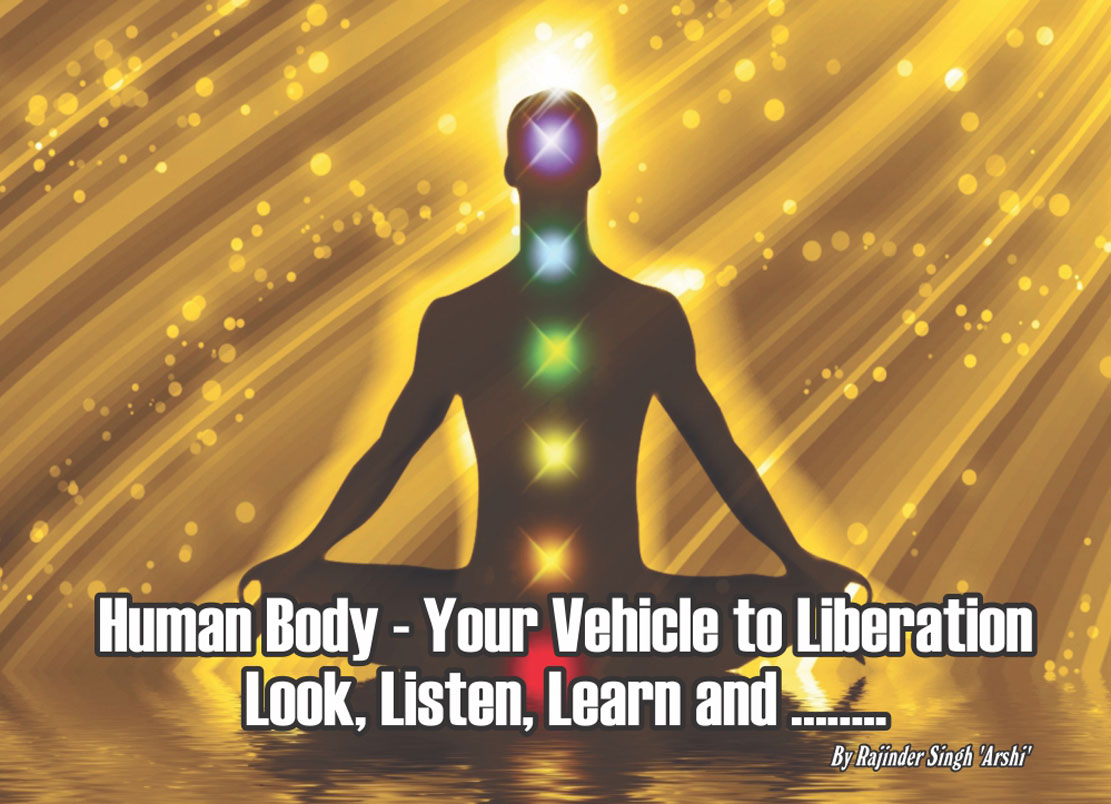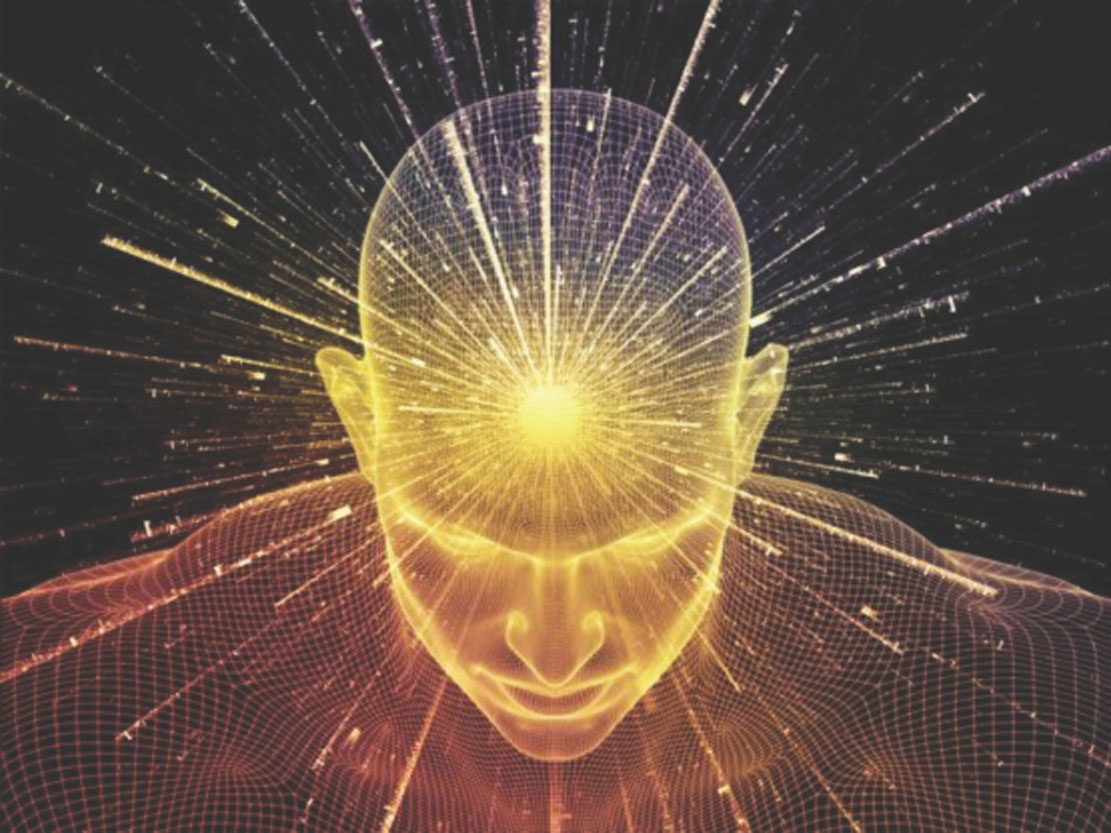
Live it (i.e., execute). The human body, composed of flesh and blood, is fashioned on the five elements, namely, air, water, earth, fire and space (sky, Akaash). In this shell of five elements, the Lord (Ik O’nkar, Akal Purkh) had placed His own Light (Jyot) and only after ‘equipping’ the human body as such He sent the mortals to this world, to the arena of Dharam Khand.
Creation of Dharam Khand (Realm of Dharma)
With one sound Ik O’nkar laid the foundation of the Karam Bhumi (the arena of action and righteousness), where he infused life into the nature for the wondrous drama to ensue. In his masterpiece, Japu Ji, Guru Nanak clarifies:
ਕੀਤਾ ਪਸਾਉ ਏਕੋ ਕਵਾਉ ॥ ਤਿਸ ਤੇ ਹੋਏ ਲਖ ਦਰੀਆਉ ॥ (੩)
Keetaa pasaao(u) aiko kavaao(u). Tis tai hoe lakh dareeaao(u).
[With One Shabd (Word) Akal Purkh (Ik O’nkar) created the vast expanse of planets and galaxies, from which flowed countless rivers.]
Guru Nanak further alludes to this in more detail in Pauri 34:
ਰਾਤੀ ਰੁਤੀ ਥਿਤੀ ਵਾਰ ॥ ਪਵਣ ਪਾਣੀ ਅਗਨੀ ਪਾਤਾਲ ॥ (੭)
Raatee rutee thitee vaar. Pavanh paanhee agnee paataal.
(Ik O’nkar created nights, seasons, lunar days, air, water, fire and the expanse of the nether worlds.)
ਤਿਸੁ ਵਿਚਿ ਧਰਤੀ ਥਾਪਿ ਰਖੀ ਧਰਮ ਸਾਲ ॥
Tis(u) vich(i) dhartee thaap(i) rakhee dharam saal.
[In the midst of all this He fashioned and established the earth, the arena for the wondrous play to be enacted by humans (and other species).]
ਤਿਸੁ ਵਿਚਿ ਜੀਅ ਜੁਗਤਿ ਕੇ ਰੰਗ ॥ ਤਿਨ ਕੇ ਨਾਮ ਅਨੇਕ ਅਨੰਤ ॥
Tis(u) vich(i) jeea jugat(i) kai rang. Tin kai naam anaik anant.
(In this vast arena He placed various categories and colors of life, known by an endless list of names.)
ਕਰਮੀ ਕਰਮੀ ਹੋਇ ਵੀਚਾਰੁ ॥ ਸਚਾ ਆਪਿ ਸਚਾ ਦਰਬਾਰੁ ॥
Karmee karmee hoe veechaar(u). Sachaa aap(i) sachaa darbaar(u).
(Each being is adjudged in His Court of Truth and Justice according to that being’s actions.)
ਤਿਥੈ ਸੋਹਨਿ ਪੰਚ ਪਰਵਾਣੁ ॥ ਨਦਰੀ ਕਰਮਿ ਪਵੈ ਨੀਸਾਣੁ ॥
Tithei sohan(i) panch parvaanh(u). Nadree karam(i) pavei neesaanh(u).
[And those who acquit themselves with merit and honour receive the glance of approval and are bestowed a seat in His court (Darbar). The insignia (symbol) of Akal Purkh’s grace radiates on their faces.]
ਕਚ ਪਕਾਈ ਓਥੈ ਪਾਇ ॥ ਨਾਨਕ ਗਇਆ ਜਾਪੈ ਜਾਇ ॥
Kach pakaaee othei paae. Nanak gaeaa jaapei jaae.
(The earthly titles and status have no relevance in His Court. The individual’s qualities are tested here based on the criteria as laid down by the Court of Truth and Justice.)
It is only here that one realises the true criteria of spiritual status. These are the laws of nature of the Dharam Khand (spiritual law of righteousness). The Jeeva (human) is sent to play his role as ordained by the Akal Purkh but before he does so, the Jeeva is given an element of free will to differentiate between right and wrong, good and evil.
The Precious Human Form
Birth in human form is considered a great boon, an invaluable gift. It is attained after many previous births in various forms. Guru Arjan enlightens us:
ਅਨਿਕ ਜਨਮ ਬਹੁ ਜੋਨੀ ਭ੍ਰਮਿਆ ਬਹੁਰਿ ਬਹੁਰਿ ਦੁਖੁ ਪਾਇਆ ॥ (੨੦੭)
Anik janam bahau jonee bhrameaa Bahur(i) bahur(i) dukh(u) paaeaa.
(I have transmigrated numerous times and endured countless tortures and sufferings, over and over again.)
The Guru further emphasises the priceless fortune of obtaining the human form:
ਤੁਮਰੀ ਕ੍ਰਿਪਾ ਤੇ ਮਾਨੁਖ ਦੇਹ ਪਾਈ ਹੈ ਦੇਹੁ ਦਰਸੁ ਹਰਿ ਰਾਇਆ ॥ (੨੦੭)
Tumree kripaa tai maanukh daih paaee hei Daih(u) daras(u) Har(i) Raeaa.
[It is only by Your Grace that I have adorned this human form; O Lord, grant me the privilege of your sovereign vision (glance of grace).]
Past actions, free from Vikaars (negative traits), and adherence to Shabd Guru and, more so, its guidance has been rewarded by the most precious gift of the human apparel. Guru Arjan confirms:
ਸਿਮਰਿ ਸੁਆਮੀ ਅੰਤਰਜਾਮੀ ਮਾਨੁਖ ਦੇਹ ਕਾ ਇਹੁ ਊਤਮ ਫਲੁ ॥ (੭੧੭)
Simar(i) suaamee antarjaamee Maanukh daih kaa eh(u) ootam phal(u).
(Remember the Lord, the Inner-Knower. This is the sublime fruit of the human birth.)
Waheguru is extremely merciful. Before the human birth, He placed within the human shell His Light (Jyot). The air, one of the five elements, circulates the body and the miraculous human instrument is ready to play its role on the world stage.
Whilst Akal Purkh brought the human shell to life by blowing air into it, He also attached therein a Chanchal Mann (restless/dynamic mind). In this mind he infused the human propensity towards worldly passions and pleasures. The yearnings of the lower self and the ever flickering mind become an ordeal to keep on the straight and the narrow.
Free Will
However, at the same time, Akal Purkh blessed the human being with a degree of free will and discernment. Although everything is in the domain of His Hukam (Ordinance), without an element of free will, the mortal has no chance of redemption. Free will exercised with the guidance of the Shabd can elevate the human mind to the upper plane of human existence, where a conscious effort is made to reign in the five thieves (lust, anger, greed, attachment/infatuation, and egoism).
As and when this free will is exercised wisely, under the guidance of Guru Granth Sahib, the Living Light, the Gurmukh (God-oriented) will attain to his higher self and peace of mind. Persistent effort and perseverance on Naam Simran and Sewa (meditation and service) will elevate the devotee towards Universal Consciousness.
The Manmukh (self-willed/self-oriented individual), on the other hand, will waste away this precious opportunity by entangling himself further in worldly affairs, subjecting his body and mind to the negative influences of the five thieves. With persistent infatuation of worldly pleasures and comforts, the individual binds himself more and more in the grip of the lower self. He will eventually suffer the consequences and render himself helpless to escape from the clutches of Maya. Guru Ramdas warns us against such leanings:
ਸਭੁ ਮੋਹੁ ਮਾਇਆ ਸਰੀਰੁ ਹਰਿ ਕੀਆ ਵਿਚਿ ਦੇਹੀ ਮਾਨੁਖ ਭਗਤਿ ਕਰਾਈ ॥ (੭੩੫)
Sabh moh(u) maaeaa sareer(u) Har(i) keeaa Vich(i) daihee maanukh bhagat(i) karaaee.
[The Lord has infused, in the human body, the infatuation of worldly possessions but He has also (through self-will) offered the opportunity to follow the path of devotion and righteousness.]
and
ਇਕਨਾ ਸਤਿਗੁਰੁ ਮੇਲਿ ਸੁਖੁ ਦੇਵਹਿ ਇਕਿ ਮਨਮੁਖਿ ਧੰਧੁ ਪਿਟਾਈ ॥ (੭੩੫)
Iknaa Sat(i)gur(u) mail(i) sukh(u) daiveh(i) Ik(i) manmukh(i) dhandh(u) pitaaee.
(Some are united with the True Guru and enjoy spiritual bliss and peace, whilst the self-willed remain entangled in worldly pursuits.)
It is imperative, therefore, that we do not let this precious opportunity to acquit ourselves with honour, go waste:
ਭਈ ਪਰਾਪਤਿ ਮਾਨੁਖ ਦੇਹੁਰੀਆ ॥ ਗੋਬਿੰਦ ਮਿਲਣ ਕੀ ਇਹ ਤੇਰੀ ਬਰੀਆ ॥
ਅਵਰਿ ਕਾਜ ਤੇਰੈ ਕਿਤੈ ਨ ਕਾਮ ॥ ਮਿਲੁ ਸਾਧਸੰਗਤਿ ਭਜੁ ਕੇਵਲ ਨਾਮ ॥ (੧੨)
Bhaee praapat(i) maanukh daihureeaa. Gobind milanh kee eh tairee bareeaa.
Avar(i) kaaj tairei kitei na kaam. Mil(u) saadhsangat(i) bhaj(u) kaival Naam.
[Use this opportunity to meet your maker (Akal Purkh, Ik O’nkar) and merge with the super consciousness. Other avenues will not take you to your goal. Seek the company of holy people, concentrate on Naam and inculcate good values.]
The Body, Jyot, Eyes and Ears
The objective is to transcend the three qualities of Maya to attain Param Pad (supreme status of spiritual being). Let us appreciate the pearls of wisdom Guru Amardas has blessed us with:
ਏ ਸਰੀਰਾ ਮੇਰਿਆ ਹਰਿ ਤੁਮ ਮਹਿ ਜੋਤਿ ਰਖੀ ਤਾ ਤੂ ਜਗ ਮਹਿ ਆਇਆ ॥ (੯੨੧)
Ai sareeraa maireaa Har(i) tum meh(i) jot(i) rakhee Taa too jag meh(i) aaeaa.
(O human! Akal Purkh had placed His light in your body before you came into this world.)
The Guru further emphasises:
ਹਰਿ ਜੋਤਿ ਰਖੀ ਤੁਧੁ ਵਿਚਿ ਤਾ ਤੂ ਜਗ ਮਹਿ ਆਇਆ ॥ (੯੨੧)
Har(i) jot(i) rakhee tudh(u) vich(i) Taa too jag meh(i) aaeaa.
(Only after the Lord placed His light in you, did you arrive in this world.)
Waheguru has given us a discerning mind (Vivek Budhi) to acknowledge and appreciate the Jyot (His light) within us. As long as we commit ourselves to the path of righteousness, with the guidance and blessings of the Shabd Guru, the light within us will keep guiding and directing us towards the Universal Consciousness, Ik O’nkar. This awareness will only come provided we do not walk through life with our inner eyes closed – always look, listen and learn.
The whole universe is a manifestation of the pervasive light – the Param Shakti’s (Primal Force’s) Consciousness pervades the entire creation.
It is human nature to cling to one’s nearest and dearest – their love and affection is reserved only for their favoured group of people, basically close friends and family. They are closely knit only for reciprocal benefit, exchange of favours; their ties are underpinned by self interests. Since the whole world is His manifestation, we must widen the circle of our affection and compassion and become more inclusive.
In 36th Pauri of Anand Sahib, we see the rosary of pearls strung by Guru Amardas:
ਏ ਨੇਤ੍ਰਹੁ ਮੇਰਿਹੋ ਹਰਿ ਤੁਮ ਮਹਿ ਜੋਤਿ ਧਰੀ
ਹਰਿ ਬਿਨੁ ਅਵਰੁ ਨ ਦੇਖਹੁ ਕੋਈ ॥ (੯੨੨)
Ai naitrauh maireho Har(i) tum meh(i) jot(I) dharee
Har(i) bin(u) avar(u) na daikh-hau koee.
(O eyes of mine! Ik O’nkar has infused His light in you; in everything that you behold see only Him and no one else.)
ਹਰਿ ਬਿਨੁ ਅਵਰੁ ਨ ਦੇਖਹੁ ਕੋਈ ਨਦਰੀ ਹਰਿ ਨਿਹਾਲਿਆ ॥ (੯੨੨)
Har(i) bin(u) avar(u) na daikh-hau koee Nadree Har(i) nihaaleaa.
(See not another, feast your eyes alone on the all pervading Universal Consciousness, the merciful Lord.)
ਏਹੁ ਵਿਸੁ ਸੰਸਾਰੁ ਤੁਮ ਦੇਖਦੇ ਏਹੁ ਹਰਿ ਕਾ ਰੂਪੁ ਹੈ
ਹਰਿ ਰੂਪੁ ਨਦਰੀ ਆਇਆ ॥ (੯੨੨)
Aih(u) vis(u) sansaar(u) tum daikhdai aih(u) Har(i) kaa roop(u) hei
Har(i) roop(u) nadree aaeaa.
(The entire world that you see is Akal Purkh’s manifestation – His image alone can be seen in it.)
ਗੁਰ ਪਰਸਾਦੀ ਬੁਝਿਆ ਜਾ ਵੇਖਾ ਹਰਿ ਇਕੁ ਹੈ ਹਰਿ ਬਿਨੁ ਅਵਰੁ ਨ ਕੋਈ ॥ (੯੨੨)
Gur parsaadee bujheaa jaa vaikhaa Har(i) ik(u) hei Har(i) bin(u) avar(u) na koee.
[By the Guru’s grace, I now understand there is only one God (Ik O’nkar).]
ਕਹੈ ਨਾਨਕੁ ਏਹਿ ਨੇਤ੍ਰ ਅੰਧ ਸੇ ਸਤਿਗੁਰਿ ਮਿਲਿਐ ਦਿਬ ਦ੍ਰਿਸਟਿ ਹੋਈ ॥ (੯੨੨)
Kahei Nanak(u) aih(i) naitar andh sai Sat(i)gur(i) miliei dib drist(i) hoee.
[Nanak says, these eyes were (spiritually) blind and only after meeting the True Guru (Enlightener) have my eyes attained omniscient vision.]

Cut Out the Worldly Din
The Lord has bestowed free will in all creatures to a certain extent. As mentioned earlier, the human form was attained after great sufferings, trials and tribulations. This reward by Akal Purkh is not accidental. This opportunity must be firmly grasped with both hands to acquit oneself with honour as another opportunity may not arise for a very long time, if at all:
ਕਬੀਰ ਮਾਨਸ ਜਨਮੁ ਦੁਲੰਭੁ ਹੈ ਹੋਇ ਨ ਬਾਰੈ ਬਾਰ ॥ (੧੩੬੬)
Kabir maanas janam(u) dulambh(u) hei Hoe na baarei baar.
(Kabir opines that the human body is a rare and precious gift; it’s not bestowed again and again.)
ਜਿਉ ਬਨ ਫਲ ਪਾਕੇ ਭੁਇ ਗਿਰਹਿ ਬਹੁਰਿ ਨ ਲਾਗਹਿ ਡਾਰ ॥ (੧੩੬੬)
Jio(u) ban phal paakai bhue gireh(i) Bahur(i) na laageh(i) daar.
(It is akin to a ripe fruit which once plucked, or falls to the ground, cannot be reattached to the branch.)
Although, as mentioned above, everything happens under Akal Purkh’s Hukam (Ordinance), He has given us free will to impact our actions in a positive manner, to take our steps with discrimination and discernment between good and evil, right and wrong. If there were no free will, we could never have a chance of redemption (Mukti) and the Guru’s dictum:
ਜੇਹਾ ਬੀਜੈ ਸੋ ਲੁਣੈ (੧੩੪)
Jaihaa beejei so lunhei
(As you sow, so shall you reap)
would have no relevance. We must exercise this free will to choose our company, to see what we wish to see, to hear what our ears prefer to hear.
Listening, learning and believing are important parts of human life. Guru Nanak considered this so important that he included four Pauris (stanzas) each, on suni-ai (listening, and attuning the mind, to Naam – the Lord’s Name) and Mannay (submit to believing and remaining saturated in Naam) in the Japu Ji.
Only after listening and contemplating can one form a strong foundation of his beliefs to nurture a strong faith in God’s existence. A separate article would be required to appreciate the importance of these eight Pauris in Japu Ji.
But, for the time being let us appreciate the basic importance of the art of seeing and hearing. There is so much unwanted and undesirable noise around us. Some we can cut out others we may have to put up with, for example, in public places. The impact of such noise can be subdued by focus and meditation, so that we only hear what we wish to hear.
The use of eyes and ears can work in tandem to see and hear what we wish. In Pauri 37 of Anand Sahib, Guru Amardas expounds the importance of hearing:
ਏ ਸ੍ਰਵਣਹੁ ਮੇਰਿਹੋ ਸਾਚੈ ਸੁਨਣੈ ਨੋ ਪਠਾਏ ॥ (੯੨੨)
Ai sravanhau maireho Saachei sun-nhei no pathaae.
(O ears of mine, know that you were given only to hear and appreciate the Lord’s praises.)
ਸਾਚੈ ਸੁਨਣੈ ਨੋ ਪਠਾਏ ਸਰੀਰਿ ਲਾਏ ਸੁਣਹੁ ਸਤਿ ਬਾਣੀ ॥ (੯੨੨)
Saachei sun-nhei no pathaae sareer(i) laae Sunh-hau sat(i) baanhee.
[You were attached to the body to listen and contemplate the True ‘Word’ (Sachi Bani)]
ਜਿਤੁ ਸੁਣੀ ਮਨੁ ਤਨੁ ਹਰਿਆ ਹੋਆ ਰਸਨਾ ਰਸਿ ਸਮਾਣੀ ॥ (੯੨੨)
Jit(u) sunhee man(u) tan(u) hareaa hoaa Rasnaa ras(i) samaanhee.
(Hearing which both the mind and body are spiritually refreshed and the tongue is saturated in the nectar of celestial bliss.)
ਸਚੁ ਅਲਖ ਵਿਡਾਣੀ ਤਾ ਕੀ ਗਤਿ ਕਹੀ ਨ ਜਾਏ ॥ (੯੨੨)
Sach(u) alakh vidaanhee Taa kee gat(i) kahee na jaae.
(The ineffable Lord is formless but wondrous, i.e., His qualities cannot be enumerated.)
ਕਹੈ ਨਾਨਕੁ ਅੰਮ੍ਰਿਤ ਨਾਮੁ ਸੁਣਹੁ ਪਵਿਤ੍ਰ ਹੋਵਹੁ ਸਾਚੈ ਸੁਨਣੈ ਨੋ ਪਠਾਏ ॥ (੯੨੨)
Kahei Nanak(u) Amrit Naam(u) sunh-hau pavitar hovahau Saachei sun-nhei no pathaae.
(Nanak says, hear His blissful, nectar drenched Name and become pure and enlightened, the purpose for which you were created.)

Look, Listen, Learn and Liberate
The whole emphasis is on the seeker to be wary of the pitfalls and to be always equipped with a high degree of awareness. With regular reading and application of Gurbani he must walk through life looking, listening and learning in all aspects of activity. This is the only way to transcend from Dharm Khand to Gian Khand and thereafter to Saram Khand and eventually to Karam Khand where the devotee must wait at His Door for a call to Sach Khand to complete the merger.
Bhakti (Jap-Tap) by itself does not guarantee Mukti (salvation). Attainment of salvation must not be the aim behind meditation and good deeds. Simran (meditation) and Sewa (service), without God’s Grace, may also remain short of complete spiritual fulfillment, which is to meet one’s maker. There is nothing in one’s hands. This world is like a stage where we perform to His script. That’s all we can do, the reward is the Lord’s prerogative.
As indicated above, we live in a noisy world. There are very few good listeners. Everyone has something to say. No one wants to listen not even to himself. To listen one has to first stop talking. Even then it may be hard to listen, the listening faculty may not respond as the mind is elsewhere. The mind must focus on what the other person is saying.
It’s even more difficult to listen to oneself. The inner voice is always saying something, but, alas! it has no audience. The mind is too busy talking to itself, sometimes conspiring with the heart chasing after worldly desires. It functions at speeds faster than lightening and refuses to still itself. The dialogue between the mind and the inner voice cannot take place under these circumstances. The mind has to be reined in, or at the very least slowed down a little. The inner voice may then get a chance to get a word in edge ways.
How do we still the mind and what do we mean by ‘stilling’ the mind? It does not mean the mind becomes stagnant or dysfunctional. It’s still very much alive, aware and alert but this time it is attuned to the frequency of the inner voice, it is in accord with the voice within – the voice of the consciousness that Akal Purkh placed within the shell when it came into being:
ਹਰਿ ਜੀਉ ਗੁਫਾ ਅੰਦਰਿ ਰਖਿ ਕੈ ਵਾਜਾ ਪਵਣੁ ਵਜਾਇਆ ॥ (੯੨੨)
Har(i) jeeo(u) gufaa andar(i) rakh(i) kei Vaajaa pavanh(u) vajaaeaa.
(Only after, Akal Purkh infused His consciousness in the human body, circulated the air, did the human instrument came into play.)
ਵਜਾਇਆ ਵਾਜਾ ਪਉਣ ਨਉ ਦੁਆਰੇ ਪਰਗਟੁ ਕੀਏ ਦਸਵਾ ਗੁਪਤੁ ਰਖਾਇਆ ॥ (੯੨੨)
Vajaaeaa vaajaa paunh nau duaarai pargat keeai Dasvaa gupat(u) rakhaaeaa.
(The air activated the instrument of body to life; whilst He revealed the nine doors, the Tenth Gate was concealed.)
The nine doors open out into the world. They give out and take in. But the Tenth Door lies hidden within and the latent force has to be untapped. To do so, a balance needs to be created. The nine doors must be disciplined and reined in to Look, Listen and Learn the real purpose of life on earth and to question why are we here?
Once the true purpose of mortal life is appreciated, the passage to the tenth door will begin to reveal. The inner eyes will begin to see – Dib Drishti (the spiritually blind eyes attaining omniscience after meeting the True Guru). The ears will begin to hear the Truth. The Sareera (body) will start performing Karma (deeds) towards liberation. It will acknowledge its true purpose and redeem itself – all this with the help and blessings of Guru Granth Sahib.
